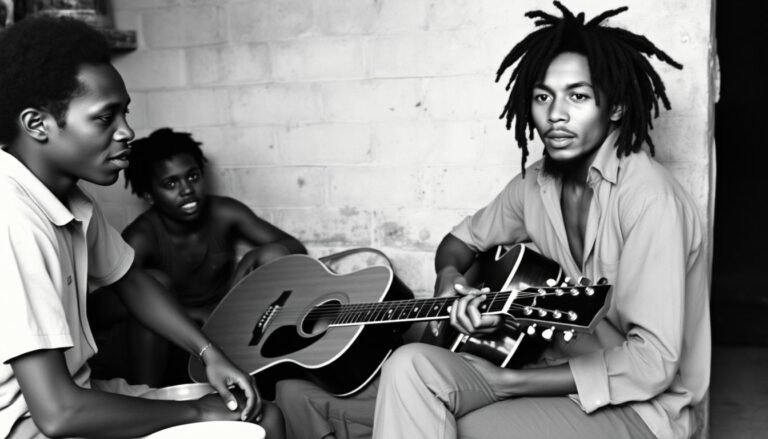Whitney Houston: The Duality of a Legendary Voice and Personal Tragedy
Few artists have captured the world’s imagination with such vocal brilliance while simultaneously battling such profound personal demons as Whitney Houston. Her story represents the ultimate paradox of musical genius and human fragility. Blessed with what many consider the greatest voice of her generation, Houston’s meteoric rise to superstardom was matched only by her heartbreaking descent into addiction and eventual tragic death. This duality—of extraordinary talent and devastating personal struggles—defines her legacy and continues to fascinate music lovers worldwide.
In this exploration of Whitney Houston’s life and career, we’ll examine the technical brilliance that made her “The Voice,” the personal battles that ultimately silenced it, and how these two narratives intertwined to create one of music’s most compelling and cautionary tales. From her gospel roots to her record-breaking achievements and eventual decline, Whitney’s story reveals the profound cost of fame and the resilience of an artistic legacy that transcends tragedy.
Whitney Houston at the height of her career, showcasing the vocal prowess that earned her the nickname “The Voice”
The Voice That Defined a Generation
Whitney Houston possessed a vocal instrument that music critics, coaches, and fans alike have described as nearly perfect. Her three-octave range, impeccable pitch control, and distinctive timbre set her apart from her contemporaries. Born into a musical family—her mother Cissy Houston was a respected gospel singer, cousin Dionne Warwick a pop star, and godmother Aretha Franklin the Queen of Soul—Whitney’s voice was nurtured in the Black church tradition, giving her performances a spiritual depth that transcended pop music conventions.
Technical Brilliance: Analyzing “The Voice”
What made Whitney’s voice so extraordinary? Vocal coaches point to several technical elements that combined to create her signature sound. Her breath control allowed her to sustain notes with remarkable stability. Her vocal placement created a rich, resonant tone that could fill arenas without amplification. Perhaps most impressively, she navigated the transitions between vocal registers—chest voice, mixed voice, and head voice—with such fluidity that listeners were often unaware of the technical complexity behind her performances.
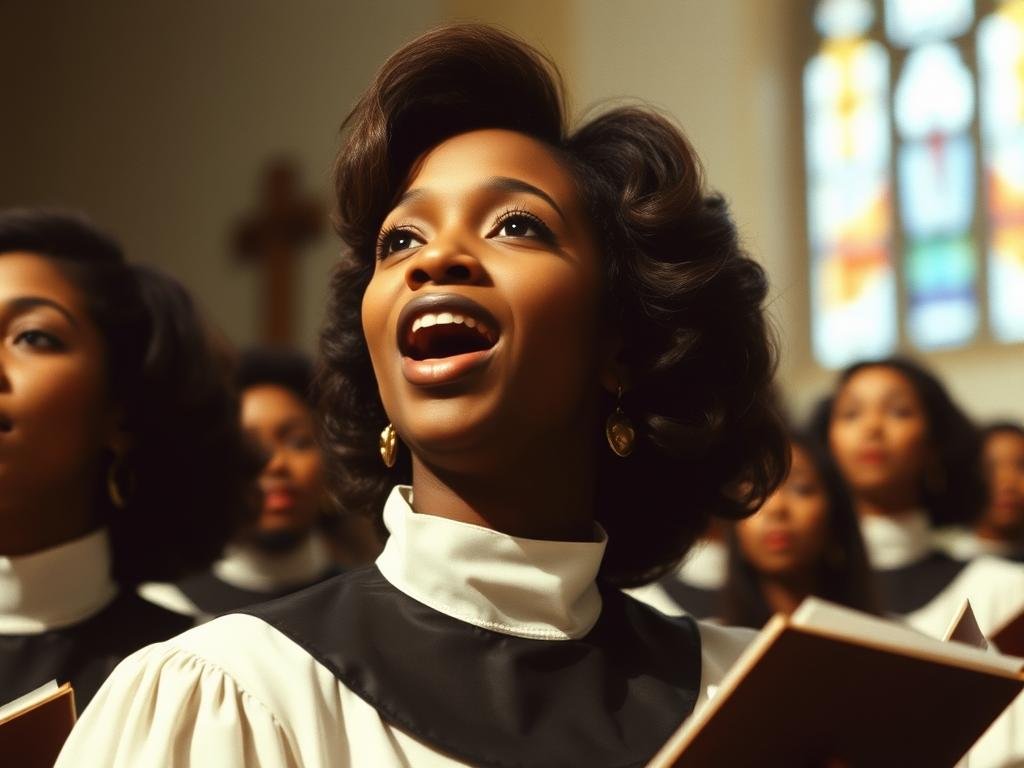
Whitney’s early years singing in church choirs established the foundation for her powerful vocal technique
However, as vocal coach Eric Arceneaux noted in his analysis, Whitney’s technique wasn’t without flaws. She often sang with a high larynx position when belting, creating the powerful sound audiences loved but potentially stressing her vocal cords. The trademark veins visible in her neck during performances and her occasionally quivering jaw were signs of tension that, while not immediately damaging, would contribute to vocal strain over time.
Iconic Performances That Showcased Her Range
Several performances throughout Houston’s career stand as testaments to her extraordinary vocal abilities. Her rendition of “The Star-Spangled Banner” at the 1991 Super Bowl transformed a notoriously difficult anthem into a soul-stirring moment that still resonates today. Her 1994 American Music Awards medley of “I Loves You, Porgy,” “And I Am Telling You I’m Not Going,” and “I Have Nothing” demonstrated her versatility across musical styles and her ability to bring emotional depth to every note.
“When you hear her… it’s like an angel from heaven singing to you with that voice. It was the greatest voice of all time.” — Clive Davis
But it was “I Will Always Love You” from The Bodyguard soundtrack that cemented her place in vocal history. The a cappella opening, the controlled power throughout, and the key change that led to the final chorus showcased every aspect of her technical mastery. The song became the best-selling single by a female artist in music history and helped The Bodyguard soundtrack achieve status as the best-selling soundtrack of all time with over 45 million copies sold worldwide.
Whitney’s performance of “I Will Always Love You” showcased her unparalleled vocal control and emotional delivery
Influence on a Generation of Vocalists
Whitney’s impact on popular music cannot be overstated. Her technique and style influenced virtually every female pop and R&B vocalist who followed her. Artists from Mariah Carey and Céline Dion to Christina Aguilera, Jennifer Hudson, and Beyoncé have all cited Whitney as a primary influence. Her ability to bring gospel-influenced vocal runs and emotional delivery to pop music expanded the technical expectations for mainstream singers.
Mariah Carey once stated, “I believe that all girls who aspire to sing have looked up to Whitney Houston.” This sentiment has been echoed by countless vocalists who studied her phrasing, breath control, and emotional delivery as a masterclass in singing. Whitney’s legacy lives on in the technical approaches and stylistic choices of contemporary artists who continue to emulate her distinctive sound.
Behind the Spotlight: Demons and Downfall
The brilliance of Whitney Houston’s voice stands in stark contrast to the darkness that increasingly enveloped her personal life. As her career soared to unprecedented heights, she battled demons that would eventually contribute to both her vocal decline and her tragic death. Understanding Whitney’s personal struggles provides crucial context for comprehending the deterioration of her once-pristine instrument.
The Pressure of Perfection
From the beginning of her career, Whitney was marketed as pop’s perfect princess—beautiful, talented, and wholesome. This carefully crafted image, while commercially successful, created enormous pressure. As a Black woman crossing over into mainstream pop, she faced additional scrutiny and criticism from all sides. Some in the Black community accused her of “selling out” with her pop-oriented sound, while she simultaneously navigated the racism inherent in the music industry.
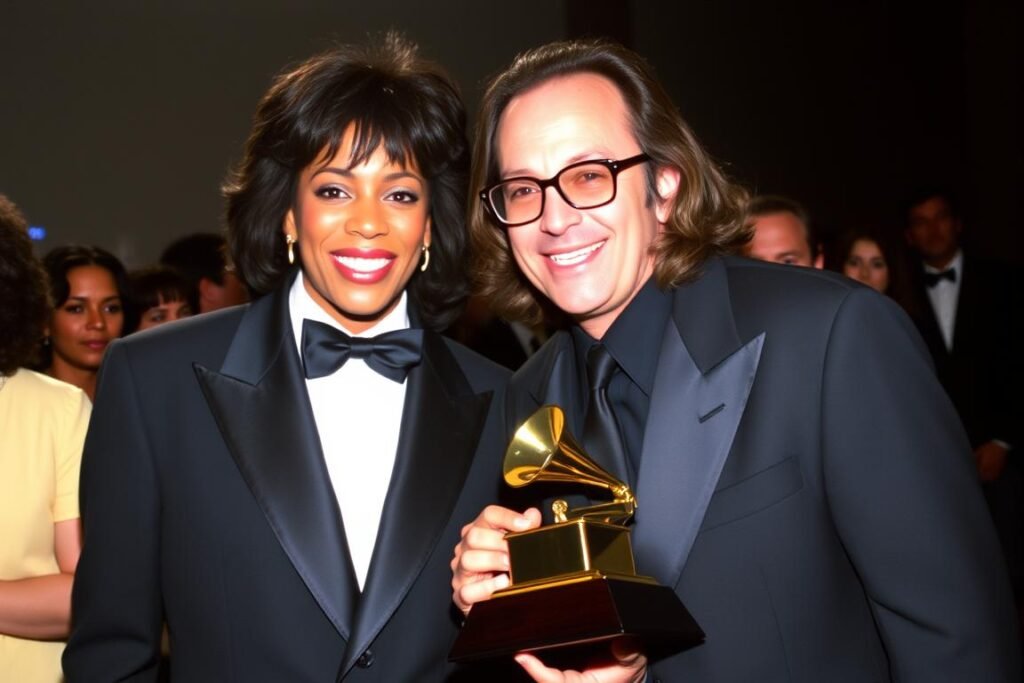
Whitney with mentor Clive Davis, who helped shape her crossover pop image
Steve Perry of Journey once described the unique pressure vocalists face: “The difference between a voice and fingers, or hands, is neurotic at best. When someone’s fingers get calluses on them, the guitar doesn’t hurt so bad. The moment a singer gets one callus, he’s finished. Singers live on the edge of being powerful, being strong, and not degrading their voice.”
For Whitney, this vocal pressure was compounded by the expectation to maintain her perfect image. The strain of living up to these expectations would eventually take its toll.
Substance Abuse and Its Impact
Contrary to popular belief, Whitney’s substance abuse issues began long before her marriage to Bobby Brown in 1992. By her own admission in her 2009 interview with Oprah Winfrey, she had been using drugs since the late 1980s. Her brother Michael admitted to introducing her to cocaine, saying it was “acceptable in society because everyone was doing it” at that time.

The physical toll of Whitney’s struggles became increasingly visible during the 2000s
The combination of marijuana laced with cocaine became Whitney’s drug of choice, a devastating choice for a vocalist. Smoke directly damages the vocal folds, causing inflammation and dryness. Cocaine constricts blood vessels, making it difficult for the voice to receive proper blood flow—essential for vocal health and recovery. Additionally, the lifestyle associated with addiction—poor nutrition, irregular sleep, and general physical neglect—further compromised her instrument.
The Tumultuous Marriage to Bobby Brown
While Bobby Brown didn’t introduce Whitney to drugs, their relationship coincided with an escalation in her substance abuse. Their marriage, which lasted from 1992 to 2007, was marked by volatile behavior, domestic disturbances, and mutual enabling. The 2005 reality show “Being Bobby Brown” shocked fans by revealing a Whitney far removed from her polished public image—erratic, confrontational, and clearly unwell.
“I don’t think [Bobby] did much to help her. When it came to getting clean, he and Nippy never seemed to be in the same place at the same time, and that made the process much harder.”
The relationship also coincided with a period of increasing professional instability. Whitney began missing performances, appearing late to events, and delivering inconsistent vocals. The physical and emotional toll of this turbulent relationship further complicated her attempts to maintain her voice and career.
Financial Pressures and Career Decisions
Despite earning hundreds of millions of dollars throughout her career, Whitney faced financial difficulties in her later years. Poor management, lavish spending, and the costs associated with maintaining her lifestyle and addiction led to periods of financial instability. These pressures influenced career decisions that would further impact her vocal health.

Whitney performing during her Nothing But Love tour in 2010, when her vocal struggles became publicly apparent
The most notable example was her 2009-2010 Nothing But Love World Tour. Despite her voice being in a compromised state, Whitney embarked on an ambitious international tour that many critics and fans believe she wasn’t physically ready to undertake. The tour, which grossed approximately $36 million, received mixed reviews, with many attendees expressing disappointment at her vocal performance. Reports suggest that the tour resulted in significant refunds and financial losses for promoters.
Whitney’s decision to tour despite her vocal limitations highlights the complex financial pressures she faced. As one promoter later revealed, “We had to weather nearly $2 million in refunds… creating an overall loss on the tour of $1.2 million.” For Whitney, the immediate financial gain may have outweighed the long-term damage to her voice and reputation.
When Voice and Life Collide: The Intertwined Narratives
The story of Whitney Houston’s voice cannot be separated from the story of her life. The two narratives—her vocal journey and personal struggles—intertwined in ways that illuminate both her extraordinary gifts and her profound challenges. By examining how these elements influenced each other, we gain a more complete understanding of her legacy.
The Vocal Timeline: Charting the Decline
Whitney’s vocal decline followed a timeline that closely paralleled her personal struggles. Vocal coaches and music critics generally identify several distinct periods in her vocal evolution:
| Period | Vocal Characteristics | Personal Context |
| 1985-1991 | Peak vocal condition. Clear, powerful tone across her full range. Effortless transitions between registers. Exceptional breath control and stamina. | Early career success. Beginning of substance use but limited impact on voice. Rigorous touring schedule. |
| 1992-1994 | Still powerful but showing first signs of strain. Development of nodules during The Bodyguard World Tour. Occasional hoarseness. | Marriage to Bobby Brown. Increased drug use. The pressure of unprecedented fame following The Bodyguard. |
| 1996-2000 | Deeper, richer tone but diminished upper range. More gravelly quality. Inconsistent live performances. | Continued substance abuse. Tumultuous marriage. Beginning of public incidents suggesting instability. |
| 2001-2008 | Significant deterioration. Limited range. Husky tone. Difficulty sustaining notes. Frequent cancellations. | Heaviest period of drug use. “Crack is whack” interview. Reality show exposure. Divorce from Bobby Brown. |
| 2009-2012 | Partial recovery followed by final decline. Deeper register with moments of former brilliance but severely compromised upper range and stamina. | Attempts at sobriety and comeback. Financial pressures leading to touring despite vocal limitations. Relapse and eventual death. |
This timeline reveals how closely Whitney’s vocal health mirrored her personal circumstances. The periods of greatest vocal decline coincided with the most turbulent times in her personal life, while moments of stability allowed for partial vocal recovery.
Technical Factors in Vocal Decline
While Whitney’s personal struggles significantly impacted her voice, several specific technical factors contributed to her vocal decline:

The transformation of Whitney’s performance style reflected the changes in her vocal capabilities over time
The Bodyguard: Pinnacle and Turning Point
The Bodyguard represents both the pinnacle of Whitney’s career and a critical turning point in her vocal journey. The soundtrack, released in 1992, showcased Whitney at the absolute height of her vocal powers. “I Will Always Love You,” “I Have Nothing,” and “Run to You” demanded technical excellence that Whitney delivered flawlessly.
However, the global success of the film and soundtrack created unprecedented demands. The subsequent Bodyguard World Tour was grueling, with Whitney performing these vocally challenging songs night after night. It was during this tour that she developed nodules, marking the beginning of her vocal decline.
“It seems that whenever immensely talented people like Whitney and others fall apart, people are quick to call it ‘a waste of their talent’ and point fingers directly at the superstars themselves, and while most of the time they are partly or mainly to blame for their own downward spiral, we must remember that as soon as they share their wondrous gifts with us they are immediately subject to the pressures of having to live up to their seemingly perfect images.”
The Bodyguard era encapsulates the central paradox of Whitney’s career: the very success that confirmed her status as one of music’s greatest vocalists also set in motion the circumstances that would contribute to her vocal decline. The six Grammy Awards she won for the soundtrack and film stand as testament to her artistic achievement, even as they represent a turning point in her vocal journey.
The Final Tour: Nothing But Love
Whitney’s 2009-2010 Nothing But Love World Tour provides perhaps the clearest example of how her personal circumstances and vocal condition intersected. Following the release of her comeback album “I Look To You,” Whitney embarked on an international tour that would prove controversial and, for many fans, heartbreaking.

During the Nothing But Love tour, Whitney often relied on backup singers and audience participation to navigate vocally challenging moments
By this point, Whitney’s voice had undergone significant changes. Her range was limited, her tone huskier, and her stamina greatly reduced. Yet financial pressures and the desire for a comeback led her to undertake a demanding international schedule. The tour became notorious for disappointed fans, some performances where Whitney appeared disoriented, and extended absences from the stage during costume changes.
Australian promoter Andrew McManus later revealed the financial impact: “We had to weather nearly $2 million in refunds… creating an overall loss on the tour of $1.2 million.” The tour’s difficulties highlighted the disconnect between Whitney’s vocal capabilities at that point and the expectations created by her legendary status.
Yet even during this challenging period, Whitney showed flashes of her former brilliance. Fans who attended the tour reported moments when her voice connected with the emotional core of a song, particularly during quieter, less demanding passages. These glimpses of “The Voice” made the overall decline all the more poignant.
Eternal Star: Legacy Beyond Tragedy
Despite the tragic arc of Whitney Houston’s life and career, her legacy transcends the narrative of decline. Her impact on music, culture, and generations of vocalists remains profound and multifaceted. Understanding this legacy requires looking beyond the tabloid headlines to recognize her lasting contributions and the lessons her journey offers.
Musical Innovations and Achievements
Whitney’s musical achievements stand among the most impressive in recording history. She remains one of the best-selling music artists of all time, with over 200 million records sold worldwide. Her seven consecutive number-one singles on the Billboard Hot 100 broke records previously held by The Beatles and the Bee Gees. The Bodyguard soundtrack, with over 45 million copies sold, remains the best-selling soundtrack album of all time.
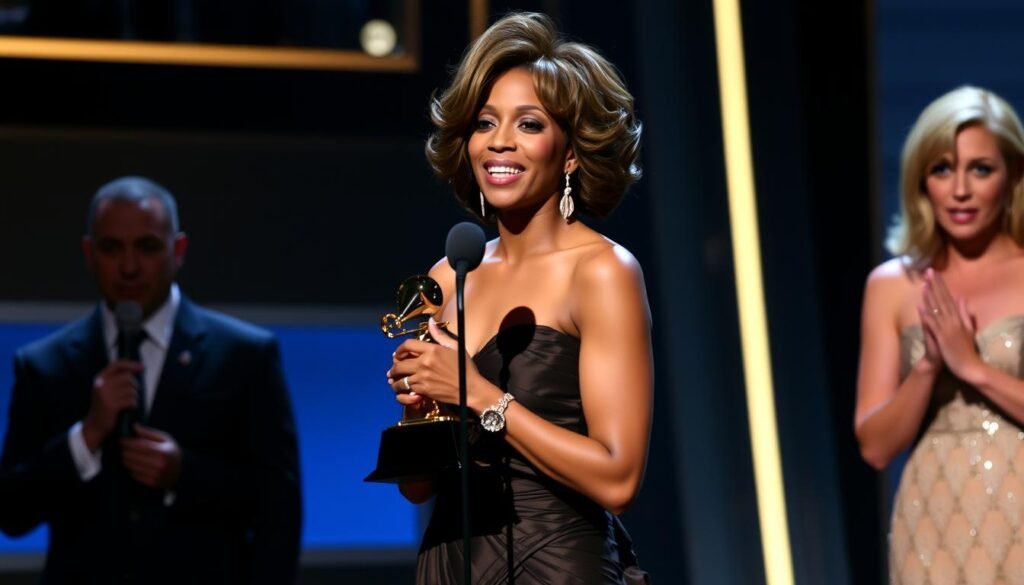
Whitney’s six Grammy Awards represent just a fraction of her more than 400 career awards and honors
Beyond sales figures, Whitney’s musical innovations changed pop music. Her blend of pop accessibility with R&B and gospel influences created a template that countless artists have followed. Her vocal arrangements, particularly her approach to melisma and runs, influenced the technical approach of a generation of singers. Songs like “How Will I Know,” “I Wanna Dance With Somebody,” and “I Will Always Love You” remain definitive recordings that continue to resonate with new generations of listeners.
Cultural Impact and Representation
Whitney’s significance extends beyond music into broader cultural representation. As one of the first Black female artists to achieve consistent crossover success, she helped break down racial barriers in the music industry. Her appearance on MTV, at a time when the network featured few Black artists, helped change the visual landscape of popular music.
“She was able to be that bridge between the Black community and the white community. She was able to be that representation of excellence that the white community respected, and the Black community was so proud of.”
Her film roles, particularly in “The Bodyguard,” “Waiting to Exhale,” and “The Preacher’s Wife,” provided rare leading opportunities for Black actresses in mainstream Hollywood productions. The success of these films demonstrated the commercial viability of Black female leads, opening doors for future generations of performers.

Whitney’s role in The Bodyguard broke barriers for Black actresses in leading romantic roles
Cautionary Lessons for the Music Industry
Whitney’s story offers profound cautionary lessons for the music industry. Her journey illustrates the human cost of the relentless demands placed on artists, particularly those from marginalized communities who face additional scrutiny and pressure.
The industry’s tendency to view artists as commodities rather than vulnerable human beings contributed to Whitney’s struggles. The expectation that she maintain both vocal perfection and a flawless public image created unsustainable pressure. When signs of vocal strain or personal difficulty emerged, the response was often to push through rather than provide support and space for recovery.
Whitney’s story highlights the need for better mental health support, addiction resources, and vocal health education within the music industry. The pressure to tour despite vocal damage, the lack of intervention during periods of obvious struggle, and the financial exploitation that continued even as her health declined all point to systemic issues that extend beyond any individual artist.
Today, partly in response to tragedies like Whitney’s, more artists are speaking openly about mental health, addiction, and the importance of setting boundaries. Organizations like MusiCares now provide resources specifically designed to support artists through these challenges. While these changes came too late for Whitney, they represent an important part of her legacy.
Remembering the Complete Artist
Perhaps the most important aspect of Whitney’s legacy is the recognition of her complete humanity—both her extraordinary gifts and her profound struggles. The tendency to either idealize her as a flawless vocal goddess or reduce her to a cautionary tale of addiction does a disservice to the complex, multifaceted artist and woman she was.

Beyond the headlines and performances, Whitney was known for her warmth, humor, and generosity
Whitney’s vocal decline doesn’t diminish her artistic achievement any more than her personal struggles erase her cultural impact. Instead, understanding the interplay between her gift and her challenges provides a more complete picture of an artist who, despite everything, continued to create meaningful work until the end of her life.
Her final recording, “Celebrate” with Jordin Sparks for the soundtrack of “Sparkle,” and her moving rendition of “His Eye Is on the Sparrow” from the same film, reveal an artist still capable of communicating profound emotion even with a diminished instrument. These final performances remind us that Whitney’s artistry extended beyond technical vocal perfection to encompass interpretation, phrasing, and emotional authenticity.
“I rise and fall, yet through it all, this much remains…”
In the end, Whitney Houston’s legacy is not defined by the tragedy of her decline and death, but by the extraordinary gift she shared with the world. Her voice—in all its iterations, from the pristine perfection of her early years to the weathered emotion of her final recordings—continues to move listeners and inspire artists. The tragedy of her personal struggles doesn’t diminish this gift; rather, it reminds us of the humanity behind the extraordinary talent that will forever be known simply as “The Voice.”
Honoring The Voice: A Legacy That Endures
Whitney Houston’s journey from gospel-singing child prodigy to global superstar to tragic figure represents one of music’s most compelling narratives. The duality of her extraordinary vocal gift and her personal struggles creates a legacy that continues to resonate with audiences worldwide. Her story reminds us that behind every legendary voice is a human being navigating the complexities of fame, expectation, and personal demons.
What remains undisputed is Whitney’s place in the pantheon of music’s greatest vocalists. The technical brilliance of her instrument, the emotional depth of her interpretations, and the cultural impact of her success have secured her position as one of the most influential artists of all time. Her voice—in all its iterations—continues to inspire, move, and connect with listeners across generations.
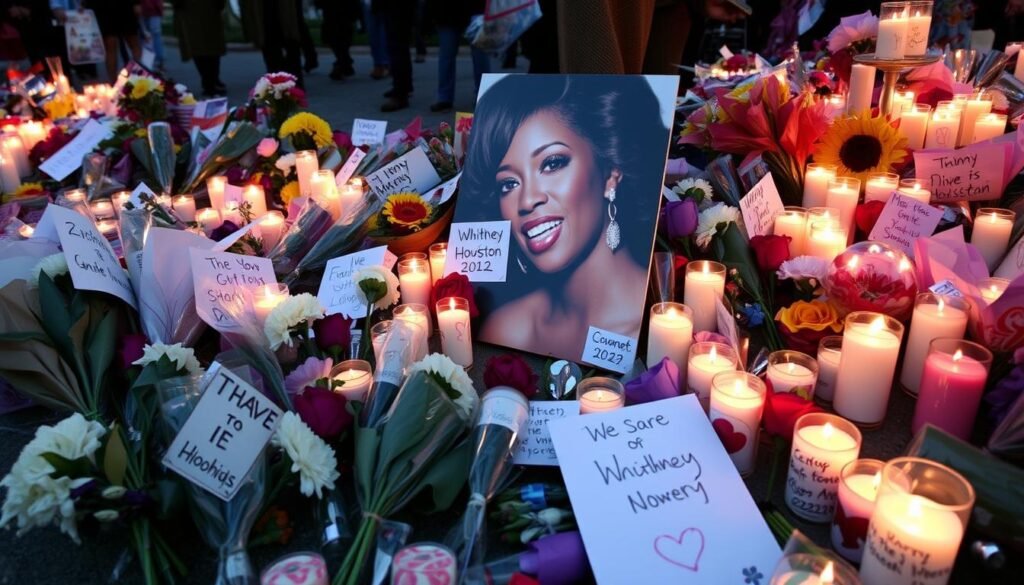
Fans around the world mourned Whitney’s passing in 2012, creating memorials that celebrated her musical legacy
Perhaps the most fitting tribute to Whitney Houston is to remember her completely—to celebrate her extraordinary gift while acknowledging the very human struggles that accompanied it. In doing so, we honor not just “The Voice,” but the woman behind it who, despite everything, gave the world some of its most unforgettable musical moments.
Share Your Whitney Houston Memories
What’s your favorite Whitney Houston performance or song? How did her music impact your life? Join the conversation by sharing your thoughts and memories in the comments below or on social media.
Frequently Asked Questions About Whitney Houston
When did Whitney Houston develop vocal nodules?
Whitney Houston developed vocal nodules during The Bodyguard World Tour in 1993-1994. According to vocal experts, she was unable to take adequate time off to recover, which contributed to permanent changes in her vocal quality. The development of these nodules marks a significant turning point in her vocal journey.
Did Whitney Houston have formal vocal training?
No, Whitney Houston did not have extensive formal vocal training. She developed her technique primarily through her experience singing in church choirs and through guidance from her mother, Cissy Houston, who was herself an accomplished vocalist. Later in her career, after developing vocal problems, she did work with vocal coach Dr. William Riley, who also helped Celine Dion recover from nodules.
What was Whitney Houston’s vocal range?
At her peak, Whitney Houston possessed approximately a three-octave vocal range. She was classified as a lyric soprano with an ability to extend comfortably into both lower and higher registers. In her later years, her range diminished to about 2.5 octaves, with particular limitations in her upper register.
How many Grammy Awards did Whitney Houston win?
Whitney Houston won six Grammy Awards during her career, including Album of the Year for “The Bodyguard” soundtrack and Record of the Year for “I Will Always Love You.” She received a total of 25 Grammy nominations throughout her career. Beyond Grammy Awards, she won more than 400 awards in total, making her one of the most decorated female artists of all time.
What was Whitney Houston’s last performance?
Whitney Houston’s last public performance was on February 9, 2012, just two days before her death. She joined singer Kelly Price on stage at a pre-Grammy party for an impromptu performance of “Jesus Loves Me.” While her voice was raspy and limited during this brief appearance, witnesses reported that her star power and presence still captivated the audience.



